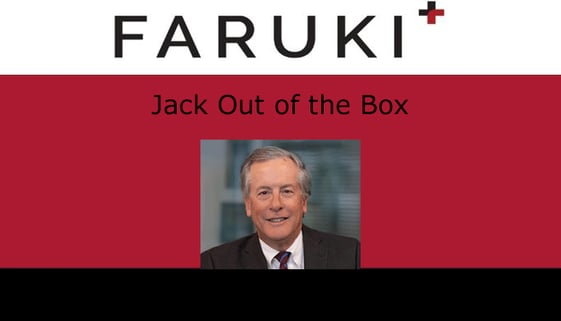- August 14, 2023
- Jack Greiner
- Jack Out of the Box
 Brandon Straka, a Nebraska man who was criminally convicted for his role in the January 6 riot at the U.S. Capitol recently lost a defamation case against NBC for its reporting on his involvement. Straka’s plea agreement in his criminal case rendered the NBC reporting substantially true and torpedoed his defamation claim.
Brandon Straka, a Nebraska man who was criminally convicted for his role in the January 6 riot at the U.S. Capitol recently lost a defamation case against NBC for its reporting on his involvement. Straka’s plea agreement in his criminal case rendered the NBC reporting substantially true and torpedoed his defamation claim.
Straka contended in his lawsuit that NBC broadcast a number of defamatory statements about him, including that Straka committed the "Federal crime of storming the Capitol;" that Straka "[broke] into the Capitol" on January 6, 2021; that Straka was "convicted" of "trying to help attack police officers" and that Straka "confessed"" and was found "guilty" of "helping attack police."
Unfortunately for Straka, court documents which NBC supplied to the Court showed that Straka had entered a plea of guilty to count one of an information charging him with Engaging in Disorderly and Disruptive Conduct in the Capitol Building or Grounds, in violation of 40 U.S.C. § 5104(e)(2)(D). In the plea agreement, Straka acknowledged that the Statement of Offense, attached to the plea agreement, fairly and accurately described his actions and involvement in the offense. He agreed and stipulated to the factual basis for his guilty plea and agreed that if the case were to proceed to trial, the United States could prove the agreed- to facts beyond a reasonable doubt. The Statement of Offense provides that Straka "knowingly entered the restricted area at the U.S. Capitol Grounds." It further provides:
While in the restricted area, knowing he was not authorized to be there, Straka observed the crowd yelling and U.S. Capitol Police trying to prevent people from going into the U.S. Capitol and to manage the unruly crowd. Amongst other things, he engaged in disruptive conduct by participating, along with others, in yelling "go, go, go" to encourage others to enter the U.S. Capitol while the U.S. Capitol Police were making their best efforts to prevent people from doing so. Straka also observed others yelling to take a U.S. Capitol Police Officer's shield. He recorded a video of what was happening, and in the video, he chimed in with the crowd, saying ''take it, take it." He did this between 2:30 and 2:45 p.m. on January 6 while outside the entrance to the U.S. Capitol in the restricted area on the Capitol Grounds. Straka left the U.S. Capitol Grounds at approximately 3:00 p.m.
Also, Straka agreed that he "knew at the time he entered the U.S. Capitol Grounds that that he did not have permission to enter the Grounds, and the [he] did so with the intent to impede, disrupt, or disturb the orderly conduct of a session of Congress."
Straka’s admissions proved to be an impossible hurdle for his defamation claim. As the court noted, to prevail on a defamation claim, the plaintiff has to prove the statements are false. But the standard is not precision. A statement that is "substantially true" is not false. The question is whether the statement at issue would have the same effect on the reader as the literal truth.
The court found that NBC easily established the substantial truth of its reporting. As the court stated in its Order dismissing the case, "[t]he material challenged in [Straka’s] complaint cannot be understood by a reasonable person as anything but substantially, if not literally, true. The differences between the statements NBC Universal published on cable television programs and the admissions Straka made in his criminal case are slight if not nonexistent. Although there may be no federal crime expressly denominated as ‘storming the Capitol,’ the descriptions of Straka’s conduct on January 6, 2021, would roughly equate to such a crime. He admitted committing disorderly and disruptive conduct in the Capitol building or grounds, with the intent to disrupt the counting of electoral votes. That admission made him complicit in storming the Capitol. The public record shows that he was on the Capitol grounds with other ‘Patriots’ encouraging them to enter the Capitol and commit violence. His conduct has the same ‘gist or sting’ whether or not he crossed the building’s threshold or not. The distinction between entering the Capitol building versus the grounds of the Capitol is meaningless in the context of the charges levelled against him. Straka admits he ‘chimed in with the crowd, saying 'take it, take it'’ Whether he said, 'take it away from him' or 'take the shield!' as opposed to 'take it! take it!' is another distinction without a difference. The reference is clear from the surrounding context. Whether the crime charged was a felony or misdemeanor is also a matter of no consequence. Straka admitted the public was restricted from the Capitol grounds and he was inside the grounds without authorization. In the context of the overall occurrence, there is no meaningful difference between the actions outlined in the Statement of Offense and the allegedly false statement or implication that that Straka was 'convicted' of 'trying to help attack police officers' and that he 'confessed' and was found 'guilty' of 'helping attack police.' Whatever differences there are between statements that Straka committed the federal crime of storming the Capitol and the conduct that forms the basis of his plea amount to semantic hair splitting."
In his defamation claim, Straka argued he was an innocent bystander. But his admissions in his criminal case told a different story. And the lesson here is clear, it’s never good to rely on semantic hair splitting.
